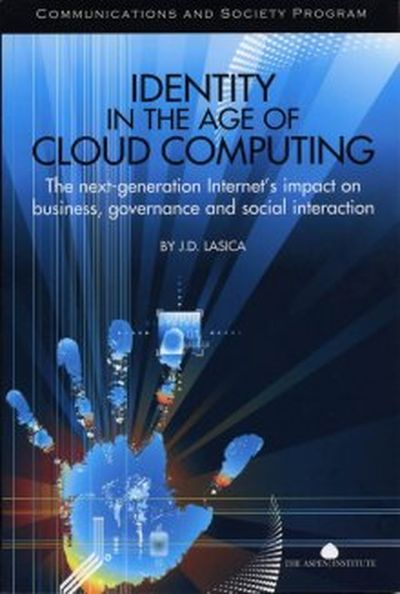|
Identity in the Age of Cloud Computing - The Next Generation Internet's Impact

Identity in the Age of Cloud Computing by J. D. Lasica
As en Ins tute | 2010 | ISBN 0898435056 | PDF | 110 pages | 1 MB
Cloud computing has quickly become a buzzword in the information and communications technology (ICT) world. It refers to themyriad of information and communications activities that are increasingly taking place in the network, broadly defined. Like the migration of electricity in the early 1900s from local generation to an electrical grid with metered service, the cloud signals the movement of hard and soft functions such as storage, software applications and services to an off premises service industry.
The clearest example would be a company that had its product endorsed by Oprah Winfrey one day and had to increase its server capacity the next day to prevent its website from crashing. Renting the huge server capacity of a major provider for the time needed, the firm would save revenues, reputation, and unneeded capital expenditures. Coming after decades of increased capacity and expectations from the desktop at the network’s edge, the burgeoning acceptance of the cloud as a way of doing business raises a number of interesting and important questions for the broader public. What control do we have over our identities, security, and privacy? How will it change economic and business models? What are the implications for governance and cyber-security? In the summer of 2008, the Aspen Institute Communications and Society Program convened 28 leaders and experts from the ICT, financial, government, academic, and public policy sectors to better understand the implications of cloud computing, and where appropriate, to suggest policies for the betterment of society.
This report by J.D. Lasica provides some background on the topic as it gives the reader the benefit of the considerable insights that emerged from the roundtable dialogue. It begins, as the conference did, with a description and definition of the cloud. Computing has evolved over time and has become increasingly more portable and personal—giving the average individual computing capabilities by way of laptops, smartphones, or any other peripheral device that connects to the internet. As data (previously stored on PCs) begins to migrate into the cloud, every aspect of life and business as we know it will be impacted. But exactly how is subject to informed conjecture. As Bill Coleman states in the following report, “We’re about where we were with the automobile, electrical power and radio in the 1910’s and 1920’s, where all we knew was what they were, but we were just beginning to understand what that meant to improve our quality of life in the future.”
Throughout the sessions personal identity arose as a significant issue. Get it right and many services are enabled and enhanced. The group tended to agree that a user-centric open identity network system is the right approach at this point. It could give everyone the opportunity to manage their own identity, customize it for particular purposes, (i.e., give only so much information to an outsider as is necessary for them to transact with you in the way you need), and make it scalable across the Net. Other ways of looking at it include scaling the social web by allowing the individual to have identity as a kind of service rather than, as Lasica writes, “something done to you by outside interests.” From identity, which has tentacles in each of the ensuing issues, the report describes and analyzes the implication of the cloud on money, commerce, and personal well-being. There are 12 features of the cloud economy alone. Businesses, for example, will no longer incur massive start-up costs to lay technical infrastructure and operate servers. Instead, they will move to a variable cost model, using server resources and paying for them only as needed. This reduces the barriers of entry, allowing for expansion to new markets, experimentation and innovation.
As it explored the implications for governance and national security, the group spent significant time on defining and protecting the line between individual liberties and the power of the state, an issue complicated by the many jurisdictions that information may touch on its path from source to recipient. As governments will no doubt have to get involved in setting standards and, indeed, laws in this field, there must also be vigilance to assure the right balance of liberty and power. In this as in the other topics of the report, Lasica goes beyond the roundtable discussion by providing context and outside research to acknowledge the complexity of the issues, yet organizes the topics in understandable conceptual language with examples. These are increasingly important issues placed in a more complicated setting, and I am pleased that we are able to present themin a clear and forthrightmanner.
Just extract the rar archive and enjoy it...
CHECK MY PROFILE AND FEEL FREE TO DOWNLOAD MORE WINDOWS SOFTWARE, THEMES, LATEST MAGAZINES, EBOOKS AND MUCH MORE STUFF FROM THIS ACCOUNT
DOWNLOAD AND SEED FOR YOUR FRIENDS
!! PLEASE SEED !! PLEASE SEED !! PLEASE SEED !!
THAT IS WHAT I ONLY NEED FROM YOU to KEEP THIS TORRENT LIVE. THANK YOU!!!
If You Like This Torrent Please Support the Authors. Please Just Buy It. Thanx


 |
|
http://fr33dom.h33t.com:3310/announce udp://tracker.1337x.org:80/announce http://9.rarbg.com:2710/announce http://cpleft.com:2710/announce http://tracker2.istole.it:6969/announce http://tracker.novalayer.org:6969/announce http://tracker.torrent.to:2710/announce http://tracker.publicbt.com:80/announce http://pow7.com/announce http://10.rarbg.com/announce http://tracker.ilibr.org:6969/announce http://tracker.torrentbay.to:6969/announce http://tracker.novalayer.org:6969/announce http://exodus.1337x.org/announce udp://tracker.1337x.org:80/announce udp://tracker.publicbt.com:80/announce udp://tracker.openbittorrent.com:80/announce |

